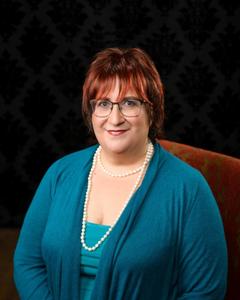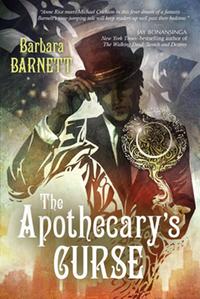
|
|
| photo: Cilento Photography | |
Barbara Barnett's debut novel is The Apothecary's Curse (Pyr, October 11, 2016). Barnett is the publisher and executive editor of Blogcritics magazine and the author of Chasing Zebras: The Unofficial Guide to House, M.D. She is the president of the Midwest Writers Association, has a degree from the University of Illinois in biology/chemistry and has worked as a microbiologist.
On your nightstand now:
So, so many books on that overburdened nightstand! Barren Cove by Ariel S. Winter. Ben Elton's Time and Time Again. Just finishing Station Eleven by Emily St. John Mandel. Always on my nightstand is Betsy Lerner's The Forest for the Trees: An Editor's Advice to Writers, which has kept me nicely grounded on the road to publication. I have it near to keep close her wonderful advice to authors about "magical" thinking--those dreadful thoughts we have when things aren't proceeding quite as swiftly as we imagine they should.
Favorite book when you were a child:
I devoured the entire Mrs. Piggle-Wiggle series by Betty MacDonald. I was enchanted by the magic, the humor and the wisdom. Then, when I was 10 or so, I discovered my brother's stash of Ian Fleming James Bond novels and Mad magazines. I was hooked, and childhood ended.
My real go-to reading when I was a kid was The World Book Encyclopedia. Yes, I was a nerd, even then, and it instilled in me a love of research (of anything and everything) that has always stayed with me. My mother was so amused by my penchant for the thing, she would generally answer any question I'd ask her by telling me to "go look it up in the World Book." I did.
Your top five authors:
The hardest question in this interview. There are so many, and the list keeps changing. Right now that would be Ray Bradbury, Kazuo Ishiguro, Philip K. Dick, Jonathan Lethem, and Kurt Vonnegut.
Book you've faked reading:
La Nausée (Nausea) by Jean-Paul Sartre for a class in French literature. I bought the Cliffs Notes and aced the exam. But I'm not proud of it. Book you're an evangelist for:
Book you're an evangelist for:
I'm always telling people to read Kim Stanley Robinson's Science in the Capitol series: Forty Signs of Rain, Fifty Degrees Below and Sixty Days and Counting. Written more than 10 years ago, it's a brilliant cautionary tale about the confluence of politics, science and global warming. It's also a compulsive read, especially for science geeks, policy wonks and politics nerds (I am all three). The science is front and center, to me the hallmark of great science fiction. The message is scary, and unfortunately becoming more science fact than fiction.
Book you've bought for the cover:
I've actually never bought a book for its cover, but a beautiful, complex cover design propels me to look beyond it. One of my favorites is the Van Gogh-esque mural created when the three volumes of Tolkien's Lord of the Rings trilogy are placed side by side (1965 Ballantine edition).
Book you hid from your parents:
Easy question: Lady Chatterley's Lover by D.H. Lawrence. They never did find out (or so I imagine), because I expect had she uncovered it beneath my pillow, Mom would have confiscated it for herself!
Book that changed your life:
Abraham Joshua Heschel's God in Search of Man? (all of his writings, actually): "Our goal should be to live life in radical amazement... get up in the morning and look at the world in a way that takes nothing for granted. Everything is phenomenal; everything is incredible; never treat life casually." This is the root of curiosity, of discovery, of research, of our understanding of the universe and our place in it. Heschel's writings on it daily inform my worldview and my writing. Hopefully, I've managed to infuse my fictional characters with this strong Heschel-ian sense of wonder and awe.
Favorite line from a book:
"When you have eliminated the impossible, whatever remains, however improbable, must be the truth." --The Sign of the Four by Arthur Conan Doyle. To me (and in my humble opinion), it's an acknowledgement that sometimes we can't get to the truth (or discovery) inhibited by blinders and biases. It is only by being open to the possibilities, however improbable.
Is it magic or science? A ghost or a delusion? A monster or a medical anomaly, for the moment, beyond our understanding? And for all of its Holmes-the-rational-man empiricist vibe, Doyle's quote jibes rather nicely with my worldview of radical amazement.
I love this idea, whether in the context of the Sherlock Holmes canon or way beyond, and have explored it in my own writing. Doyle (or maybe Sherlock himself) has whispered that line in my ear throughout my career as an author.
Five books you'll never part with:
The Science of Life by H.G. Wells and Julian Huxley, 1931 edition. By the most enduring of science fiction writers, this classic biology text always reminds me that science and science fiction are often but a hair's-breadth apart.
Charlotte Brontë's Jane Eyre--my first (and favorite) encounter with the moody-brooding Byronic hero. I've practically memorized it by now!
My dog-eared copy of Franz Kafka's 1925 novel The Trial, whose impossible labyrinthine dystopia from which there is no escape defined the genre long before Ray Bradbury and Philip K. Dick.
Joseph Heller's Catch-22. One of my favorite novels of all time, combining smart, rapid-fire writing (think Aaron Sorkin in novel form), biting dialogue and a sharp commentary on war, bureaucracy and insanity.
Finally, Charles Dana's Household Book of Poetry, which I pilfered from my parents' house when I moved from home. It's an enormous early 20th-century anthology of poetry, and it was there I first discovered as a kid the rhythm of language and my love of Coleridge, Wordsworth and so many others.
Book you most want to read again for the first time:
Tolkien's Lord of the Rings. I had to read The Fellowship of the Ring in high school as if it was a mythology textbook. Yuck. Although I've read Tolkien many times since with much pleasure, that first time robbed the reading experience of all its fun and magic. I want it back!
What makes a compulsive read for you:
The movie has to start playing in my head. Images pop and a character just grabs me by the gut or makes my heart skip a beat. I have a weakness for dark knights in tarnished armor. (I love reading about them, watching them on screen--and writing about them.) The writing has to be vivid, smart, filled with crisp dialogue and evocative settings, well-considered prose. Rich and textured--and deeply atmospheric. And the promise of a little romance (think Jane Eyre, not Fifty Shades of Grey) never hurts. When I struggle with finding "it" to read, that's when I pick up the pen (or my laptop!).

